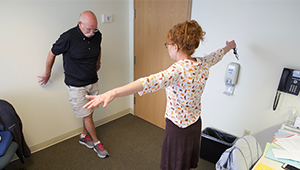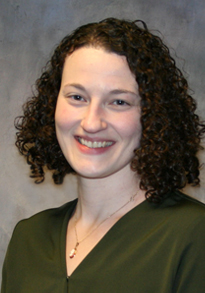Mikael Anne Greenwood-Hickman, MPH
Biography
Mikael Anne Greenwood-Hickman, MPH, brings a mixed methods approach to geriatrics and aging research. Through the application of both quantitative and qualitative methods, her work aims to better understand the lives and behavior of older adults in order to build interventions and tools to preserve cognitive and physical function and promote wellbeing.
Since completing her Master of Public Health in epidemiology at the University of Washington in 2014, Ms. Greenwood-Hickman has served in several roles within public health research teams, including as a data manager, programmer, and project manager. In 2021, Ms. Greenwood-Hickman formally joined the KPWHRI faculty as a collaborative scientist, bringing her operational knowledge and management skills to bear on her scientific portfolio.
Ms. Greenwood-Hickman’s research interests and work are primarily focused on understanding physical activity and sedentary behavior patterns among older adults and developing and testing interventions to promote physical activity and reduce sedentary time. She has been an active collaborator on the Adult Changes in Thought (ACT) Study’s Activity Monitoring sub-study since 2018. As part of this work, she has a particular interest in research that links data gathered by accelerometers (activity trackers that electronically detect up-and-down, side-to-side, and back-and-forth motion) to cognitive and physical function outcomes in later life. Her current work in ACT explores applications of the 24-hour activity cycle framework to the epidemiology of aging. Outside of ACT, Ms. Greenwood-Hickman leads accelerometer data collection and processing for ongoing intervention and observational studies using a variety of research and commercial accelerometers and platforms. She pairs this work with qualitative analysis efforts that seek to elucidate participants’ lived experience engaging in physical activity and sedentary behavior research and behavior change.
Areas of research focus
-
Aging & Geriatrics
-
Behavior Change
-
Obesity
-
Physical Activity/Sedentary Behavior
-
Built Environment
-
Chronic Illness Management
Recent Publications
Dublin S, Walker RL, Floyd JS, Shortreed SM, Fuller S, Albertson-Junkans L, Harrington LB, Greenwood-Hickman MA, Green BB, Psaty BM Renin-angiotensin-aldosterone system inhibitors and COVID-19 infection or hospitalization: a cohort study 2021 Apr 20;34(4):339-347. doi: 10.1093/ajh/hpaa168. PubMed
Dublin S, Walker RL, Floyd JS, Shortreed SM, Fuller S, Albertson-Junkans L, Harrington LB, Greenwood-Hickman MA, Green BB, Psaty BM Response to "ACE-2 downregulation and incidence of severe acute respiratory syndrome-coronavirus-2 (SARS-CoV-2) infection" 2021 Apr 20;34(4):427. doi: 10.1093/ajh/hpaa212. PubMed
Walker RL, Greenwood-Hickman MA, Bellettiere J, LaCroix AZ, Wing D, Higgins M, Richmire K, Larson EB, Crane PK, Rosenberg DE Associations between physical function and device-based measures of physical activity and sedentary behavior patterns in older adults: moving beyond moderate-to-vigorous intensity physical activity 2021 Mar 31;21(1):216. doi: 10.1186/s12877-021-02163-4. Epub 2021-03-31. PubMed
Bellettiere J, Tuz-Zahra F, Carlson JA, Ridgers ND, Liles S, Greenwood-Hickman MA, Walker RL, LaCroix AZ, Jankowska MM, Rosenberg DE, Natarajan L Agreement of sedentary behaviour metrics derived from hip-worn and thigh-worn accelerometers among older adults: with implications for studying physical and cognitive health 2021 Mar;4(1):79-88. doi: 10.1123/jmpb.2020-0036. Epub 2021-02-16. PubMed
Rosenberg D, Walker R, Greenwood-Hickman MA, Bellettiere J, Xiang Y, Richmire K, Higgins M, Wing D, Larson EB, Crane PK, LaCroix AZ Device-assessed physical activity and sedentary behavior in a community-based cohort of older adults 2020 Aug 18;20(1):1256. doi: 10.1186/s12889-020-09330-z. Epub 2020-08-18. PubMed
Healthy Findings Blog

Meet KPWHRI’s collaborative scientists
The division contributes to research across the institute with methodological and subject matter expertise.
New funding

Grant of over $55M to boost Alzheimer’s, dementia study
Kaiser Permanente Washington will co-lead an expanded ACT Program to better understand the aging brain.
Healthy Findings Blog

We decreased people’s daily sedentary time by an hour
Changing behavior isn’t easy, but Dr. Dori Rosenberg helped older people to stand and walk more.



